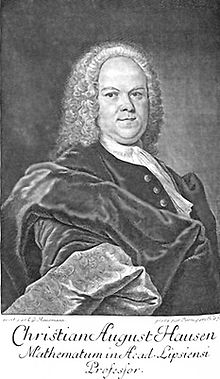Christian August Hausen the Younger
Christian August Hausen the Younger (born June 19 ( Jul. Cal.) / June 29 ( greg. Cal.) 1693 in Dresden ; † May 2, 1743 in Leipzig ) was a German mathematician, mineralogist, astronomer and physicist.
Live and act
Christian August Hausen is the son of the Dresden pastor Christian August Hausen the Elder (1663–1733) and his wife Catharina (born Beringer, † 1723). After attending the city school in his hometown and the Saxon state high school in Meißen , he began studying at the University of Wittenberg on March 30, 1711 . Initially pursuing a degree in theology, he studied the oriental languages with Georg Wilhelm Kirchmaier and philosophy with Johann Christoph Wichmannshausen . At the same time he had also attended lectures on logic with Georg Friedrich Schröer , in lower mathematics with Ernst Christian Schröder , in higher mathematics with Johann Andreas Planer , in physics with Johann Baptist Röschel and rhetoric with Johann Wilhelm von Berger .
On October 17, 1712, he earned the degree of master's degree in philosophy. In 1714 he completed his habilitation at the University of Leipzig and, on the order of the elector, became an associate professor of mathematics there in the same year. Soon after, he embarked on a scientific journey that would take him through Germany, Switzerland, France and England. In 1724 he returned to Leipzig, where he became a full professor of mathematics in 1726 , reading in this capacity about Newton's Arithmethicam universalem, whereby he constantly tried to connect the mathematical sciences with the other natural sciences. He wrote treatises on mineralogy. He was the first to discuss a method of determining the period of rotation of the sun from observations of sunspots , and most of all he emerged as the one who introduced the glass electrifying machine in Germany. His research on electricity led him to be the first to suggest that nerve and brain pathways might function in a similar way.
Hausen also took part in the organizational tasks of the Leipzig University. He had received supervision of the Pauline College in 1732, was Decemvir of the University, member of the Grand Princes College, Pro Chancellor of the University, Dean of the Faculty of Philosophy and was Rector of the Alma Mater in the winter semester of 1731 . His most famous students were Abraham Gotthelf Kästner and Gottfried Heinsius . He was also a member of the Royal Prussian Academy of Sciences from November 27, 1726 . His writings gave Immanuel Kant the first suggestions for important philosophical definitions. The lunar crater Hausen was named after him.
His marriage to Friedricke Juliane Troppanneger in 1731 resulted in two daughters and three sons. Only one son, Karl Renatus Hausen (1740–1805), survived his father.
Works
- De Hierosolymis aureis. Wittenberg 1713
- De demonstratione existentiae dei, de ellipsibus infinitis propositiones geometricae. Leipzig 1714
- Theoria motus solis circa proprium axera, quam disputatane per loco in amplissima… proposuit. Leipzig 1726
- De perceptionum idearumque in mente humana productione et nexu.
- Considertiones hydraulicae de aquae effluentis mensura, ad Loca aliquod Frontini explicanda.
- De vi perceptiva animae.
- De contradictionibus skepticorum.
- De substantia et accidente.
- De rebus quibusdam ex regno minerali
- De variis modis per ignem aliquid significandi
- De variis cognnitionis et ingeniorum humanorum generibus it.
- De styli, quo eruditi homines utuntur varia indole.
- De catione et reasctione cont. Keilium et Defagulierum.
- Elementa mathesos. Leipzig 1734
- Novi profectus in historia electricitatis. Leipzig 1743 (edited by JC Gottsched )
literature
- Ersch , Gruber : General Encyclopedia of Sciences and Arts . 2. Section 3. Part p. 176 ( online )
- Pomeranian News of Scholarly Things. Johann Jacob Weitbrecht, Greifswald, p. 734, ( online )
- Moritz Cantor , Jacob Minor: Kästner, Abraham Gotthelf . In: Allgemeine Deutsche Biographie (ADB). Volume 15, Duncker & Humblot, Leipzig 1882, p. 440 f.
Web links
- Works by and about Christian August Hausen the Younger in the German Digital Library
- Martin Schneider: Hausen, Christian August . In: Institute for Saxon History and Folklore (Ed.): Saxon Biography .
| personal data | |
|---|---|
| SURNAME | Hausen, Christian August the Younger |
| BRIEF DESCRIPTION | German mathematician, astronomer, mineralogist and physicist |
| DATE OF BIRTH | June 29, 1693 |
| PLACE OF BIRTH | Dresden , Electorate of Saxony , Holy Roman Empire |
| DATE OF DEATH | May 2, 1743 |
| Place of death | Leipzig , Electorate of Saxony , Holy Roman Empire |
